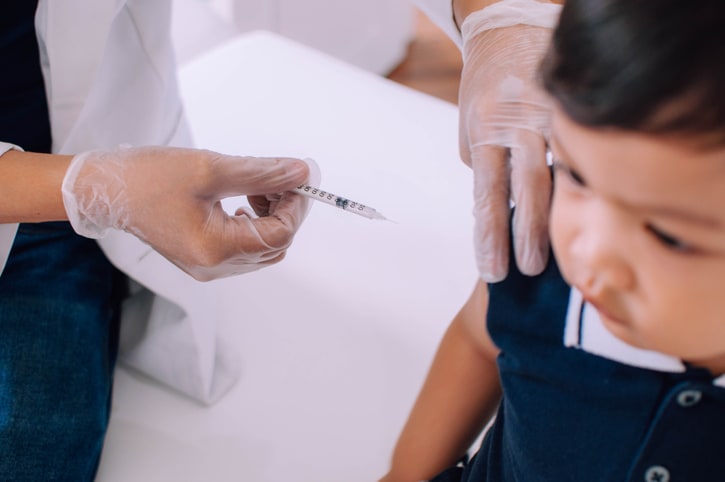After a number of hiccups, last week the Food and Drug Administration (FDA) and the Centers for Disease Control (CDC) both voted to grant emergency use authorization for two COVID vaccines in children under 5. The announcements resulted in a collective sigh of relief for many parents of young kids, but the authorizations have also opened up a new can of worms: deciding between the Pfizer-BioNTech and Moderna vaccines.
“When it comes to the vaccines, there are a few small considerations for some families,” says Dr. Christina Johns, a pediatrician, pediatric emergency physician and senior medical advisor for PM Pediatrics. “However, it’s important to note both vaccines are safe and effective, and the general guidance is to get whichever one you have access to.”
Wondering which jab is better? Here’s what experts want you to know when it comes to the differences between the Pfizer-BioNTech and Moderna vaccines for kids 6 months to 5 years.
Do the COVID vaccines for kids under 5 work differently?
When COVID vaccines first became available for adults, there was a lot of talk about mRNA science (despite it having been studied for decades). Unlike many vaccines we’re used to, which, according to the CDC, puts a “weakened or inactivated germ into our bodies,” mRNA is “created in a laboratory to teach our cells how to make a protein,” which ultimately will trigger an immune response.
“The Pfizer and Moderna vaccines are similar and both use mRNA science,” says Dr. Jennifer Kusma, a pediatrician with Ann and Robert Lurie Children’s Hospital of Chicago and instructor of pediatrics at Northwestern University. “Both have great safety data, which will continue to be monitored and were approved by the Advisory Committee on Immunization Practices (ACIP).”
“The Pfizer and Moderna vaccines are similar and both use mRNA science.”
— DR. JENNIFER KUSMA, PEDIATRICIAN
What are the age ranges for the Pfizer and Moderna vaccines?
There’s a slight difference between Pfizer and Moderna in terms of availability based on age. The differences are:
- Pfizer: 6 months to 4 years
- Moderna: 6 months to 5 years
Pfizer COVID vaccines, it’s worth noting, are already available for kids aged 5 and up.
What are the vaccine doses?
“Compared to adults, the Pfizer dose is relatively smaller,” notes Kusma. “In kids 6 months to 5 years, Pfizer is 1/10 of the adult dose while Moderna is 1/4 of the adult dose.”
How many shots does each vaccine require?
With the Pfizer vaccine, there are three injections; with Moderna, two or three for moderately to severely immunocompromised children.
“In kids 6 months to 5 years, Pfizer is 1/10 of the adult dose while Moderna is 1/4 of the adult dose.”
— DR. JENNIFER KUSMA, PEDIATRICIAN
How are doses administered and spaced apart?
Pfizer (non-immunocompromised)
- Dose 1.
- Dose 2: 3-8 weeks later.
- Dose 3: At least 8 weeks after Dose 2.
Moderna (non-immunocompromised)
- Dose 1.
- Does 2: 4-8 weeks later.
Pfizer (immunocompromised)
- Dose 1.
- Dose 2: 3 weeks later.
- Dose 3: At least 8 weeks after Dose 2.
Moderna (immunocompromised)
- Dose 1.
- Dose 2: 4 weeks later.
- Dose 3: At least 4 weeks after Dose 2.
With Pfizer, kids are considered fully protected 13 weeks after their first shot; with Moderna, six weeks from the first shot. Currently, there are no boosters available for either.
What are the COVID vaccine side effects?
“The side effects were largely described as mild in both trials,” Johns says. “However, with Moderna, participants had slightly more side effects than Pfizer, which is not surprising given Moderna’s higher dose.”
In the Moderna trial, 21% to 26% of children 6 months to 5 years developed a fever after each dose, whereas in Pfizer’s trial, around 7% of kids 6 to 23 months reported fever after each dose. Fewer kids in the Pfizer trial reported fatigue, as well.
“The side effects were largely described as mild in both trials. However, with Moderna, participants had slightly more side effects than Pfizer, which is not surprising given Moderna’s higher dose.”
— DR. CHRISTINA JOHNS, PEDIATRICIAN
There was one Moderna study participant who had a febrile seizure after the first dose, Johns notes, “but stayed in the study and did fine after the second dose.” She also adds: “No myocarditis cases have been reported, but monitoring agencies are watching this closely.”
According to Kusma, side effects for both Pfizer and Moderna may include:
- Redness or soreness at the injection site (thigh or arm).
- Increased sleepiness.
- Decreased appetite.
- Axillary and inguinal lymphadenopathy (swollen lymph nodes under the arms or at the leg crease).
- Fever.
In children over 2 years, side effects may include:
- Vomiting.
- Headache.
- Muscle pain.
- Diarrhea.
Which vaccine for children is more effective: Pfizer or Moderna?
“Pfizer may have slightly higher effectiveness after the third dose according to blood antibody levels, but takes longer to get to that state,” says Johns. “With only two doses, Moderna produces higher antibody levels in a shorter amount of time,” which again, according to Johns, is likely why there is “slightly higher risk of temporary side effects” with the latter.
That being said, Johns also notes that pinpointing exact efficacy in both is more nuanced than looking at numbers. “The two trials were conducted during different time periods — one during omicron (Moderna), one not (Pfizer) — and these were immunobridging studies where the primary outcome was comparing blood antibody levels of study children to those of persons in the older cohorts (16-25), not effectiveness.” Put another way: The studies were looking to see how the kids’ antibody levels compared to vaccinated 16- to 25-year-olds (Pfizer) or 18- to 25-year-olds (Moderna) after vaccination.
“Doing a direct, one-to-one comparison is challenging and can be misleading,” she adds. “Both are effective in preventing severe illness and death.” Johns also notes that there’s “currently enough data to know the full time extent of protection.”
The bottom line
“Parents should seek out whichever vaccine first becomes available to them for their child, as both protect against severe diseases, including hospitalization, MIS-C and death.”
— DR. JENNIFER KUSMA, PEDIATRICIAN
Both Kusma and Johns recommend inoculating young kids with either the Pfizer or Moderna vaccine. “The CDC has recommended the COVID-19 vaccine for all children aged 6 months and older,” Kusma says. “In general, parents should seek out whichever vaccine first becomes available to them for their child, as both protect against severe diseases, including hospitalization, MIS-C and death.”
And if you have any questions, go to your healthcare practitioner, not Facebook. “Talk to your pediatrician if you have questions and concerns,” Johns says. “We are a more reliable source than social media.”





